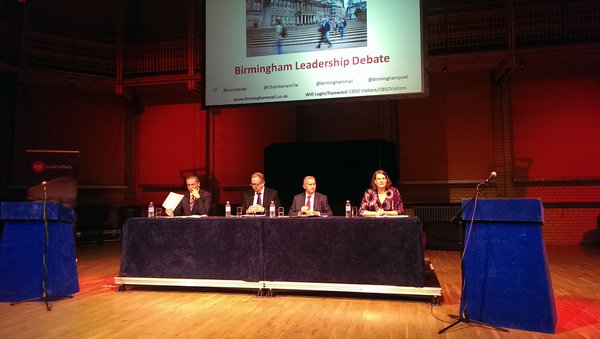With the announcement of a West Midlands mayor just a day or so before, this hustings started to feel a little bit like bald men fighting over a comb. But that’s not true; one of the candidates is a woman. We sent Jonathan Todd to see what went on at the Birmingham Labour leadership hustings.

79 Labour councillors will on Monday vote to decide the next leader of Birmingham City Council. Some of these councillors were in the CBSO last night, including the four standing for this office. They were joined by about 100 of the great Brummie public, who questioned the candidates after they’d presented their pitches.
Female, young, and non-white demographics were underrepresented in the audience (and, in the non-white case, on the stage). Perhaps we can’t blame the four leadership candidates for this (or for being white). It reflects a broader malaise of political disengagement.
The candidates commendably made themselves available for a grilling from those who, for the most part, do not have a vote on Monday. The candidates had, therefore, little to gain and much to lose. Poor performance would be punished by the watching media (BBC West Midlands filmed from the floor as the event was ongoing), while strong performance would largely not be witnessed by those who hold their fate in their hands.
It was, hopefully, a small step into a new era. One not only of enhanced openness and transparency but improved working methods. They all professed eagerness to move away from the high handed ways of the city council. To forge new partnerships with stakeholders in pursuit of shared goals. (To be fair, that last sentence is more management speak than any of them subjected us to – but there was quite a bit of that).
They all insisted that they had not offered any jobs on the city council cabinet for votes on Monday. Patronage is out; appointment on merit is in. They all adopted this line during questioning but only Barry Henley majored on it during his opening pitch. In so doing, he sought to differentiate the promised Henley administration from that of the outgoing Sir Albert Bore (or “the previous leader”, as his deputy Ian Ward, now seeking the top job, referred to his unutterable boss).
Ward declared himself “very different” from Sir Albert, while holding out his relationship with the Improvement Panel of the Kerslake review, which the UK government put in place after longstanding substandard performance by the city council. This strong relationship, he claimed, would prevent the panel recommending to the UK government that they save Birmingham from itself by having the city council run from Whitehall. Yet this relationship only exists by virtue of Ward’s position on Sir Albert’s team, which might call into question how different he really is.
John Clancy is a perennial Sir Albert opponent and presented a vivid policy break with the Bore years. This future was one of much new housing, a Birmingham Municipal Bank and free school meals. Henley opened his pitch with derision at “promises that are easy to make and difficult to keep”. Henley didn’t name Clancy in making this charge but it did feel like an attempt to deflate the balloon that Clancy had just inflated.
Nor did Penny Holbrook refer to Ward when she said, “we already have an employer matching scheme”, but this felt like a swipe at the promise made a few minutes earlier by Ward to establish similar. It may have been my imagination but they seemed to prefer implied criticisms to direct attacks; raised eyebrows and folded arms to more blunt verbal instruments. Maybe the new era isn’t so transparent after all.
And perhaps it was another figment of my imagination but did Holbrook consistently draw the warmest applause?
While I found her references to making Birmingham “the first city of our nation” somewhat hard to grasp, she can be pleased with her night’s work. In policy terms, Clancy is the most distinctive candidate. But Holbrook is groundbreaking in other ways. She comes from a younger generation. Consequently, she personifies a break with the past, which Clancy seeks to conjure with his policy commitments.
In the terms of their subtle criticisms, these commitments are held against Clancy by the other candidates. In effect, they are saying that they risk the Improvement Panel concluding: “The city council is not making the steps that we require. Instead they now have a leader that is unfocused on them and concentrating on a series of unrelated endeavours. Whitehall must run Birmingham.” This would be a strange turn for the government that gave us the so-called Localism Act. But, nonetheless, where Clancy promises big change, the other candidates imply this risks major embarrassment.
Clancy had, though, the last word. “The Midlands Engine can roar like a Jaguar,” he argued, with a mix of government rhetoric (the Midlands Engine comes from the people who gave us the Northern Powerhouse) and Top Gear terminology. “Let’s build (many new houses), let’s roar,” he concluded.
Jump with Clancy into his roaring Brum. Or submit to Kerslake related fears and plump for the safety first options of Henley, with his stress upon bureaucratic competence, or Ward, with his familiarity with the Improvement Panel. Or Holbrook, a continuity candidate in having – unlike Clancy – served on Sir Albert’s cabinet, but a change candidate in how she looks and feels. This mix may be an alluring cocktail for Holbrook to serve on Monday.
That’s the choice: although, of course, it’s not yours.

Teresa Stewart was the first female leader of the council, back in 1993 – https://en.wikipedia.org/wiki/Theresa_Stewart
Cheers Simon, you’re right. Have made a tweak, although I don’t think it changes JT’s thrust thankfully.